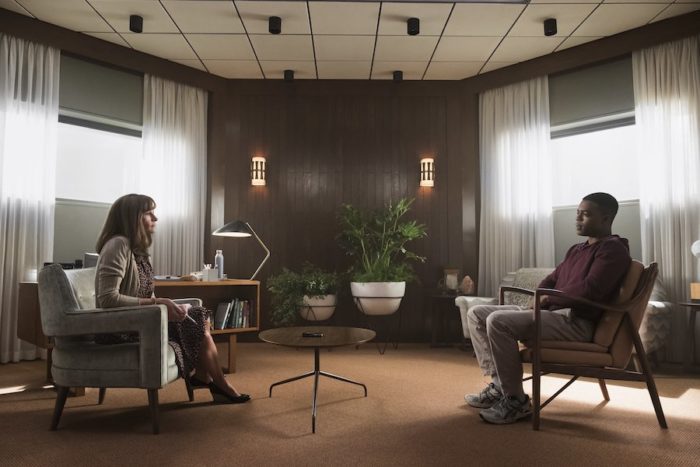Amazon UK TV review: Homecoming (Season 1)
Review Overview
Julia Roberts and Stephan James
8Sam Esmail
8Surprises
6David Farnor | On 02, Nov 2018
It’s a sign of just how big TV has become that one of the big screen’s biggest stars has now taken her first top billing on the small screen. None other than Julia Roberts makes her telly debut on Amazon’s new show, Homecoming, and what’s impressive about it is just how small the end result is.
Based on the hit podcast of the same name, the thriller follows Heidi (Roberts), a case worker at the Homecoming initiative, a program overseen by a large private company that works to help soldiers transition from the military and back into civilian life. But when we first catch up with her, several years later, she’s no longer at the scheme, and can’t remember a thing about it.
A shady organisation? Check. Secret ulterior motives? Check. Homecoming is a textbook example of a conspiracy thriller, and it plays things by the book. Who better, then, to direct it than Sam Esmail? Esmail updated that very same book for the modern age with Mr. Robot, and he continues to do so here. He’s in his element when playing in the same sandbox as Hitchcock and Pakula, but it’s Brian De Palma that perhaps remains his biggest touchstone: the opening episode sets the style with a gorgeous long tracking shot that sweeps us through the Geist Corporation’s building, from Heidi’s office along a corridor and down a staircase, every twist of the frame a taste not only of the turning plot points to come but the confusion of its characters; it’s a masterclass in precise disorientation, dizzying detachment, and precisely what you’d expect from a tale told by Esmail’s camera.
That’s the only shortcoming of Amazon’s glossy drama: it doesn’t go anywhere that you won’t have seen before by countless entries in the same genre. But it’s the way that it gets there that makes for such engrossing viewing; Homecoming’s journey, not the destination, is what matters, the verb and very act of moving from one place to another.
That transition, initially, belongs to Walter (Stephan James), Heidi’s latest patient, who is back on US soil and attempting to adjust back to normality. But is he really in the USA? Is this institute actually located in Florida, as we’re told? Why is a gigantic pelican prowling the office car park, like something out of a daydream? And what is the real end goal of his treatment, which sees Heidi pick through his personal memories, session after session? His uncertainty seeps through the whole production – and even into Heidi, who’s in a similar state when we catch up with her in her new job. Now working in a seafood restaurant miles away, why does she recall nothing of her time at Homecoming? And why is she being drawn into an investigation by the Department of Defense?
Homecoming’s success lies in making everything about their central relationship. The titular journey is as much hers, a step back towards remembering Walter; it’s a heartfelt tale of two lonely people (one, out of step with the world around him, the other, a fish out of water in a pond that has its own, hidden current) and the connection they forge. Stephan James, who is about to blow everyone’s socks off in If Beale Street Could Talk, is remarkable as Walter, bringing a warmth and humour to a role that could easily have been played as stoic and cold. His quiet blankness, instead, is channeled by Roberts, who buries her natural charisma beneath a layer of fog and sadness; she’s so understated she’s almost unrecognisable, particularly when you compare the ‘present day’ Heidi (about four years in the future) with the Heidi we see in the Homecoming offices, the former distant and frustratedly aware of it, the latter friendly and compassionate, her familiar smile emerging the closer she and Walter become.
Esmail’s shadow looms large, as he stitches together the puzzle with technical wizardry, including some jaw-droppingly slick use of split-screen. But the composition, as with Mr. Robot, is always tied to character. In a bold, brilliant move, Heidi’s 2020 scenes are shot in 4:3, not only distinguishing the two timelines, but also highlighting just how boxed in she has become. It’s one of the best use of aspect ratios since Xavier Dolan’s Mommy; it’s only when Heidi is with Walter that she feels she has the full picture, and the disjunct between the two turns the whole series into something visibly driven by her quest to expand her knowledge. The production design by Anastasia White and cinematography by Tod Campbell (both Mr. Robot veterans) flawlessly echoes those two distinct vibes; the older sequences hum with a nostalgic warmth (the offices are gloriously retro in their decor), gorgeous depth of field and fluid visuals, all accompanied by softer music, while the newer sequences are brown, flat and bluntly cut, with a more sinister, staccato score. (The soundtrack is pulled from classic paranoia thrillers and horrors, featuring tracks from Klute and Carrie, among others.)
And yet Mr. Robot this isn’t: where that show relishes its expansive, lengthy montages and political diatribes, Homecoming is a more intimate, lower key affair. Episodes fly past in 30-minute bursts, the pacing admirably taut, while still finding time to flesh out Sissy Spacek as Heidi’s protective, skeptical mother, Jeremy Allen White as Walter’s smartly suspicious friend, Schrier, and a scene-stealing Bobby Cannavale as Colin, Heidi’s boss, whose pushiness subtly covers his own doubts and insecurity. A lot of the show, as you’d expect for a podcast-inspired project, is based around conversations, and Esmail’s achievement is making sure that Colin and Heidi’s constant, badgering phone calls feel like interruptions in a wider story rather than the star attraction – something that wouldn’t be possible without a cast operating at the top of of their game.
The result is a topical thriller that taps into concerns about abuse of power and secret military actions, as well as paranoia and distrust, and the 10-part ride is accelerated by our character’s creeping sense of dread, as trauma comes to the surface – not only that of Walter, but also those around him (his mother – played moving by Marianne Jean-Baptiste – and Heidi are both grappling with a sense of loss). But it’s that emotional hook, rather than the overall conspiracy narrative, that proves the real driver of the series: the final chapters are almost anti-climactic, as we reach an end point anchored in tiny details, but it’s a satisfying and moving finish for a story of deceptive nuance, where the simple act of sitting down for a meal carries huge importance. Memory and identity are the themes on Homecoming’s menu, served in deliberately miniature portions but asking nonetheless big questions. Do we need to forget to move on? Do we pretend to forget to protect each other? And what about that pelican, huh? With a second season already in the works at Amazon, Julia Roberts’ TV career has got off to an impressively inconspicuous, polished start.




















